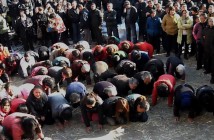
Year Five of Projection: Oscar began on August 31, 2015, when I emerged from hibernation feeling refreshed and excited for another Oscar season.
I think I needed that freshness and positive outlook to weather the storm that was brewing. Clearly, the film award gods were looking out for me.
Now, almost six months later to the day, there’s not much left to do than finalize the menu, prepare the minibar, put our final predictions to bed, and reflect on the torrential season that was.
It started like any other – the Fall Festivals debuted a great many of the major players we’ve been discussing ever since, from Spotlight to Room to even more mainstream titles like Bridge of Spies and The Martian, which debuted at NYFF and TIFF, respectively, before bowing nationwide. Brooklyn had premiered earlier, at Sundance, but reintroduced itself at TIFF. And we had a select few early-year holdovers that managed to stay in the game – Mad Max: Fury Road, Inside Out, Ex Machina, Straight Outta Compton. All was well on the Oscar front.
So how did we get to the point where two movies that opened in December – The Big Short and The Revenant – somehow became the Best Picture frontrunners?
In my September 23 post, cutely dubbed “How the Oscar Season May Already Be Over,” I noted how vital the aforementioned Fall Festivals had become in the Oscar race. No film to debut after the autumn triad of Venice/Telluride/Toronto has won Best Picture since Million Dollar Baby. The modern path to Best Picture glory seems to be landing a spot at one of those Big Three fests, building solid debut buzz, and then mounting a campaign that can persist under the conditions of the Oscar marathon. Spotlight seemed like that movie…and guess what? It may well be that movie when the final envelope is opened tonight. But what’s remarkable is that this recent, decade-long trend of Best Picture winners being bred during the September-October festival frame now hangs its hopes of continuing on this one movie, which is thickly in the hunt but is by no means a sure thing.
It’s not as if somehow, if the string breaks, it won’t be rebooted again next year; the power of Venice and Telluride and TIFF is only getting stronger, frankly, so even if Spotlight fails to claim Best Picture, it’s not like we should be banging the nails into the coffin of this last decade of legit Oscar stats. But it’s a very unique sign of this season that no one seemed to fall under the spell of a particular film and remain there for the duration.
“Unique” is, without question, the word of this season. There’s not quite been another season like it, even as we pundits and bloggers are always desperately in search of an analogous stat to hang our certainty on. Certainty, such as it is, was surgically removed from this season, and all of us feel the burden of subsisting without our vital ego-fueled organ.
All seemed to be going according to plan. Spotlight won over the critical masses, winning the bulk of the regional critics group Best Film prizes – though it had to tussle with Mad Max: Fury Road, which became nearly equal in critical support by virtue of its sheer cinematic awesomeness. It was also during this frame where Spotlight director Tom McCarthy was pummeled into Oscar also-ran status, since Fury Road’s George Miller claimed the vast majority of critics group Best Director awards, a consistent drubbing that ingrained in many folks’ minds this notion that McCarthy’s solid, economical direction was somehow not quite remarkable enough to hold sway. Perhaps that was step one in the deconstruction of Spotlight’s presumed domination, perhaps not.
As there always is, 2015 possessed a handful of late-season releases from major directors, unknown entities that threatened to alter the trajectory of the race. I mean, we had movies from the likes of Quentin Tarantino and David O. Russell and even the defending Best Picture/Best Director champion, Alejandro G. Inarritu. There was a also a rough-and-tumble upstart insurgent from comedy director Adam McKay that Paramount was prepping. But the trend bears out over several years now that most of these late-game releases can’t really hold up against films that have already well-established themselves earlier in the season.
A couple of this year’s films lived up to that trend – namely the Tarantino and the Russell. But the other two – The Revenant and The Big Short – took the season by storm and did, legitimately, alter the race in a significant way, so much so that they now split the majority of pundit and blogger predictions for tonight’s Best Picture win. Difficult to fully encapsulate the swarm of events that led to the ascendance of both, but I think it has a lot to do with the clear evidence of each film’s strengths. The Revenant is a very ambitious film made my a revered filmmaker of the moment, one that touted a tale of production under horrendous conditions, was shot in all natural light, and carried the weight of star Leonardo DiCaprio’s liver-eating, carcass-sleeping Oscar prowess. The Big Short, meanwhile, is flashy, ballsy, and funny, breaking the fourth wall and injecting snarky intelligence into both its narrative and its aesthetic. Plus, it’s a hot-button movie that delivers a direct hit to the corporate greed that is a major issue in this election cycle. When compared against Spotlight’s relative solid level-headedness – again, maybe its ultimate hamartia – these two films hit the season with cinematic bombast.
The race unfolded as a clash of diametrically opposed stylistic endeavors – the presumed frontrunner, standard-bearer of that key fall festival stat, but decidedly “non-flashy” endeavor against the two late-season, higher-style insurgents. Big Short took the Producers Guild prize, which seemed like it would seal the deal for Adam McKay’s movie. But oh wait…a week later, Spotlight reclaimed the mantle by winning Best Cast at the Screen Actors Guild. All of the sudden, we had a two-film race. But hang on…another week later, Inarritu won the Directors Guild award for the second straight year, thus formally initiating Oscar Chaos. The three most indicative industry guilds split in three different directions. Whatever we attempt to claim as our final predictions, nothing can be claimed as “definitive.”
So that’s where we stand – confused and befuddled, clinging to stats that hang by a thread. Most people are predicting The Revenant in a sweep or mini-sweep, and it’s certainly a valid pick. The DGA is enormously reliable as an Oscar predictor, and it’s the most recent of the three top films to claim a major guild victory, plus it followed DGA with wins for Best Film and Best Director at the BAFTAs. On the other hand, though, it’s not like the BAFTAs are some sterling Oscar predictor, and there’s reason to believe the British Academy was making up for neglecting Inarritu’s Birdman last year (another very recent example of BAFTA not matching Oscar). On Spotlight’s side is the SAG win, and indeed, the actors make up the largest swath of Academy membership. But then again, SAG has the shakiest Best Picture track record of the three major guilds, and their membership is certainly oddly weighted with the recent addition of AFTRA. The Big Short can claim to have the most indicative stat on its side – the PGA is the only other group to employ a preferential ballot similar to the Academy’s, and since both AMPAS and PGA instituted said preferential ballot, the PGA has matched Oscar’s Best Picture winner every year without fail. That, to me, is the ultimate stat to watch…and the only real stat anyone can hang their hats on, since PGA is batting 1.000 in the years since preferential was employed.
But in reality, as ever, no one knows anything. I say it all the time, but in this case, put bronze coating over those words and preserve them on the mantle of this season. Remarkable that, even with six months’ worth of data already on the books, our certainty in predicting the Best Picture result is only vaguely stronger now, on February 28, 2016, than it was on August 31, 2015.
Six months of answers and the final question remains as thickly veiled as ever.



